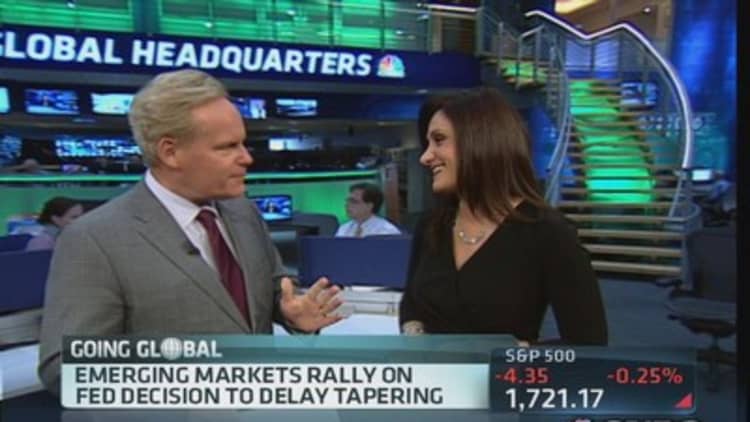Have global investors been missing the emerging market right next door?
Since a paper in 2001 focused investors' attention on the BRICs—Brazil, Russia, India and China—those countries' stock markets, averaged out, have risen about 400 percent. Meanwhile, the exchange of the emerging market at America's doorstep has risen more than 650 percent.
And in a time of dizzying capital flows in emerging markets—draining dry on expectations of the U.S. Fed tightening policy, then sloshing in again when Ben Bernanke on Wednesday unexpectedly kept the monetary fire hose blasting—Mexico looks rock solid by comparison.
(Read more: Emerging markets party as Fed keeps punch bowl)
Andrew Karolyi, director of the Emerging Markets Institute at Cornell University, said such wild volatility and destabilizing speculation is in no one's interest.

"Investors are not flighty by nature," he said. "They are naturally long-term oriented and seek out countries in which they can have confidence over the long term."
Mexico is engendering that confidence with both policy reforms and the country's inherent strategic advantages. It's easy to forget just how sizable the economy is: Fourteenth in the world, ahead of South Korea. Brandywine Global portfolio manager Jack McIntyre points to other enviable characteristics: A balanced government budget, a steadily growing population, a dramatically reduced deficit and relatively high interest rates.
He says that people who turn away based on media accounts of drug cartel wars are the ones who will miss out. Karolyi agrees: "Investors forget about (Mexico) at their peril."
Karolyi also argues that some investors focus excessively on U.S. Federal Reserve policy.
"Mexico is affirming the confidence of the foreign investor," he said, by liberalizing previously overprotected markets, including oil and gas. The initiative to loosen state-owned Pemex's total control of petroleum resources is a cornerstone of President Enrique Peña Nieto's agenda. But just what form a liberalized energy market—opposed by many who see oil as a national treasure—will take remains to be seen.
It is the openness to foreign participation that tends to spur more inflows of capital over the long term, Karolyi said.
(Read more: Good news for emerging markets: 'multi-week rally' may loom)
He offered the counter-example of Argentina, whose nationalization of oil company YPF last year marked a "backwards step" that would have a far greater negative impact on foreign investment than any action by the Fed.

Charles Sizemore, a portfolio manager at Covestor, agrees that the prospect of an open energy market offers great opportunities—"just look for anyone who could benefit from increased oil development," he said—but argues that sectors across the board deserve a look.
"You can't overstate the benefits Mexico enjoys through NAFTA and by being next door to the U.S.," he said, adding that the country appears to be growing only more attractive.
As labor markets in China and elsewhere mature and wages rise, Mexican labor becomes more competitive even if still more expensive. "What you lose in higher wages you get back in faster, cheaper transport and the benefits of a known, friendly territory," including an abundance of bilingual talent, he said.
Luxury bedding maker Kluft is one U.S. company investing in the Mexican market, and high manufacturing standards are one reason. In Mexico, CEO Earl Kluft said, the company "is working with a trusted partner capable of the craftsmanship these luxury products require. That's not the case everywhere. For instance, Kluft finds it necessary to export American-made mattresses to China."
(Read more: Colombia learns free trade can't fix everything)
Kluft says that an increasingly stable economy and a growing middle class make Mexico ever more attractive to companies like his, adding that he expects the luxury market to grow at 10 to 15 percent annually. Mexico's economy is expected to pick up steam next year to grow at about 4 percent, according to the finance ministry.
"Direct investment is what every emerging market wants, more than the hot money that rushes in and all heads for the door at the same time," said Sizemore of Covestor.
Global investors are keeping an eye out for "predictable, reliable, secure domestic institutions," added Karolyi. Mexico's increasing success in building them "may indeed be why we haven't seen the intensity of capital outflows there," he said.
—By CNBC's Matt Twomey. Follow him on Twitter @Matt_Twomey.

